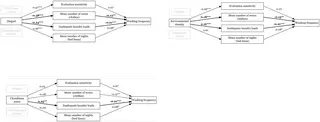The amount of laundry washed by European consumers has grown excessively for reasons that cannot be explained by demographics alone. Initiatives trying to curb this trend have repeatedly failed.
Previous studies have largely overlooked the psychological dimensions of laundering behaviour. In three separate studies we investigate how disgust, shame, cleanliness norms and environmental identity, mediated through a set of preceding behaviours, affect washing frequency.
Our results highlight how conflicting psychological goals between disgust sensitivity and pro-environmental identity can undermine willingness to change laundry behaviour.
Policy recommendations are suggested, and future research challenges are discussed.
In this article we argue that people are confronted with an implicit dilemma when deciding whether to wash or not: reducing emissions but risking social repercussions. Since the latter take priority for the general consumer, it comes as no surprise that previous interventions have been unsuccessful in steering behaviour.
Of special interest is the potential influence of the emotion of disgust for cleanliness evaluations regarding clothes, and by extension wash frequency. Specific policy recommendations for laundering include treating reduced emissions as a beneficial by-product rather than the main objective. This means focusing more on the underlying behaviours that create a need to wash rather than the act of running the washing machine.
More specifically, efforts should be made to extend the use frequency of clothes between washes by desensitizing feelings of disgust.
Further avenues to be explored include a better understanding of the relative importance of shame and guilt for laundering behaviours. This would allow for better adjustments of pro-environmental initiatives when these are deployed in either honour-related societies, or societies that emphasize individualistic values.


